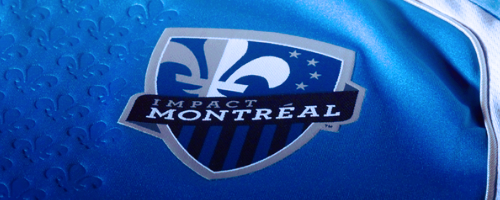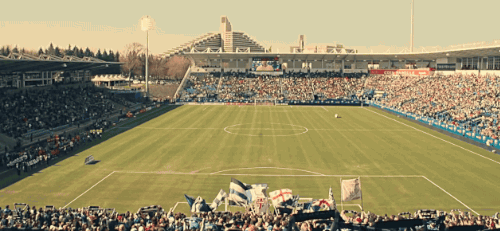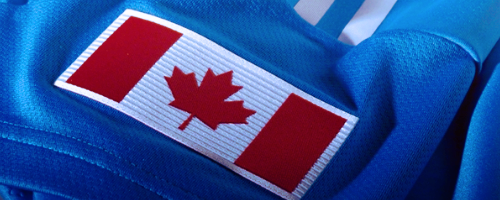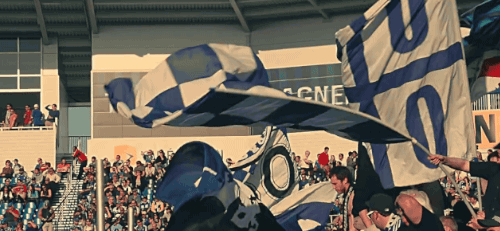Take two takes the Montréal Impact closer to its identity
Take two takes the Montréal Impact closer to its identity
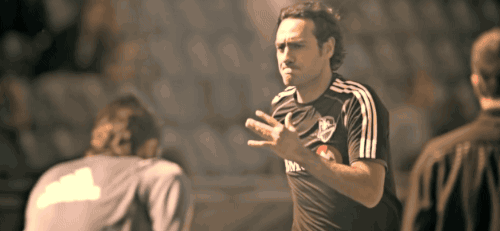
Take two takes the Montréal Impact closer to its identity
By Matthieu Labaudinière, a French Bostonian based in Montréal. Quotes collected by Eric Beard.
“This is a cosmopolitan city, a much more European city than most North American cities… we are playing in a way that’s more similar to what people would like to have, looking more like Europe. I think [Impact] Montréal is reflecting a lot about what Montréal is. The team is reflected also because we are [composed of] Americans, Canadians, Europeans. Hopefully we can continue to represent Montréal very well.” - Patrice Bernier, a Québécois midfielder for the Montréal Impact.
The streets here have never felt like North America. The signs are written in French. Here, a car could fit in a bike lane. Just outside downtown, there’s housing. Lots and lots of housing. Probably ten units for everyone one business. Most American cities have a bustling feel of “live to work.” Citizens of Montréal work to live. Montréal is a collaborative art piece. The classic style of apartment is a 3 story house: one door on the ground floor for the lower apartment and an outdoor staircase leading to the 2nd and 3rd story apartment doors. This stays constant. However, each unit has a different color palette. As you walk down a block, one may be white doors with green borders, and then the next one blue borders around brown doors. The resulting landscape is colorful and natural. The Québécois feel they are different. And well… they are.
“The culture is different. Our fans didn’t accept that we brought in so many American players. They wanted to see European and South American players. When we talk about the philosophies not being the same, that’s what it was.” – Joey Saputo
When the Impact joined MLS last season, they hired Jesse Marsch, an American coach with previous MLS experience. They adjusted to fit in and be just another MLS team, but fitting in has never been Montréal’s strong suit. After spending a year playing along with a rigid style of play, the fans voiced their discontent. Although the results weren’t terrible by any means, the supporters didn’t know how to identify themselves. This football team did not represent their footballing ideals.
Joey Saputo administered an overhaul this season, starting with the dismissal of Marsch, to bring in a more fluid footballing system. Some were offended by Montréal’s attempt to un-Americanize the American league. It was seen as disrespectful to the very league that gave a spot to Montréal. It was as if MLS had this obsession with preserving the American style of soccer, and the Impact were jeopardizing that. But people don’t enjoy following a monotone league.
Teams have personality, and even though Arsenal doesn’t play the “English game,” we appreciate the beauty. We enjoy the tactical complexity of leagues with diverse clubs. MLS needs to understand the distinction between club and international football. For example, in Europe’s top leagues, national anthems aren’t played at club games because not every club player is of that nationality. Clubs should be associated with people and fans, not nations. When we refer to the English style of play, we speak of the national team, not necessarily all of the teams in the leagues. Here in MLS, Montréal is starting the same phenomenon. Likewise, Chivas USA is adopting a style not far from its Mexican counterpart. Having diverse teams will create a more dynamic, more exciting, more personal league.
When you look at the Impact team roster right now, less than half the players are from North America. The other fifteen hail from Italy, France, Brazil, Argentina, Bosnia-Herzegovina, Colombia, Gambia, and Scotland. When you see how Montréal plays, this stat doesn’t surprise you. There’s flair, fluidity, and vision. The defense has Italian concentration, South American fluidity brings the team forward, and the midfield is completed by hard-working, athletic North Americans. And then there are four former academy stars.
When Karl Ouimette started his first Impact game against the New York Red Bulls in March, AFR was there to observe his performance. Coming in, we talked about the necessity of a strong academy. Acquiring veteran players from Europe and South America is not a sustainable system. If only a few quality players come out of the Academy, that can free up funds for other players, turning the Impact from a consistent mid-table team to a title challenger year after year. In the locker room after that game on March 23rd, AFR spoke with one of the academy players, Wandrille Lefèvre, about the Impact, the academy and youth, and soccer around Montréal. His described hope and new possibilities for the game in Québec.
“[The first team] is a huge transition [for me]. But the fact that Karl [Ouimette] signed last year gave us a lot of hope. Now both Max, Tissot and Crépeau signed, I signed, that’s 4 with Karl, in a couple of months. So that’s a good thing for soccer in Québec… It’s a lot of hope for younger players in Montréal because they see that with the academy, it’s something possible.” - Wandrille Lefèvre
Since Wandrille said these words, a lot has changed. Karl went on to start two more games. Max Tissot got a few minutes too. And last Saturday, I was able to witness Wandrille getting his first 36 minutes against the Chicago Fire (the game ended 2-0, a good start). After the match, Wandrille talked about learning from Nesta, how honored he was to replace Nesta during the game, his assist, and most importantly, his concentration on helping the team. Four days later, the Impact called again on defenders Tissot and Lefèvre in for a full 90 minutes. They responded by keeping a clean sheet as Montréal beat Toronto 6-0 to progress in the Canadian Cup.
“When you can be on a daily basis with guys like Nesta, Di Vaio, and many more, that’s huge. The first time I went into the locker room and I saw that ‘okay, I am in the same locker room as a guy I was watching in the World Cup, the Champions League, a couple of years ago’ that was huge. But then, you have to get used to it. You have to think that he is a guy in your team. Even if he has a different status in the world of soccer, you are still a teammate to that guy. You have to play with him, you have to play for him, he has to play for you.” - Wandrille Lefèvre
That’s the mentality of the Impact, and the mentality of the citizens of Montréal. The city is a collective work, and the Impact get that. They have developed a club that is a collaborative project, just like the city they represent. There don’t seem to be large egos in the dressing room, and the young players get time on the field. The Impact retired the number 12 jersey in honor of the 12th man, the fans. And when you see the fans, especially the Ultras Montréal, you understand why. It’s not a coincidence that Montréal is undefeated at home this year and topping eastern conference with the least amount of games played.
“They are our number 1 supporter. They are the soul of the club. With them at the stadium, they keep the atmosphere alive and busy and buzzing. It’s great to have that in Montréal, not every team has that.” –Patrice Bernier
The Ultras are a force. The Impact worked with them to create a successful supporter section in Stade Saputo, which has no seats, just benches. When you spend the game there, you realize why. No one sits down. Everyone is up on their feet. The Ultras lead the chants all game long, the leaders barely get to watch the game. There are flares and streamers and drums. Scarves and flags. But most of all, there are Montréalers, fans of the Impact, individuals who are doing their integral part of the whole, their civic duty to the Impact.
“They are a huge support for us. When I was young and I saw them when we were playing at Claude-Robillard, and I look at now, the way it is, how huge they are, the support that they brought this game, all the games before, it’s huge. When you are warming up and you hear them, that’s huge.” – Wandrille Lefèvre
The Montréal Impact is becoming huge. The club is becoming huge because each individual involved feels a part of what looks to be an increasingly sustainable system, one that represents the character of a whole, remarkably multifaceted and multicultural city.
NB: All Bernier/Lefèvre quotes acquired by AFR on 3/23/13
This post was written by Matthieu Labaudinière, a French Bostonian based in Montréal. Comments below please.

